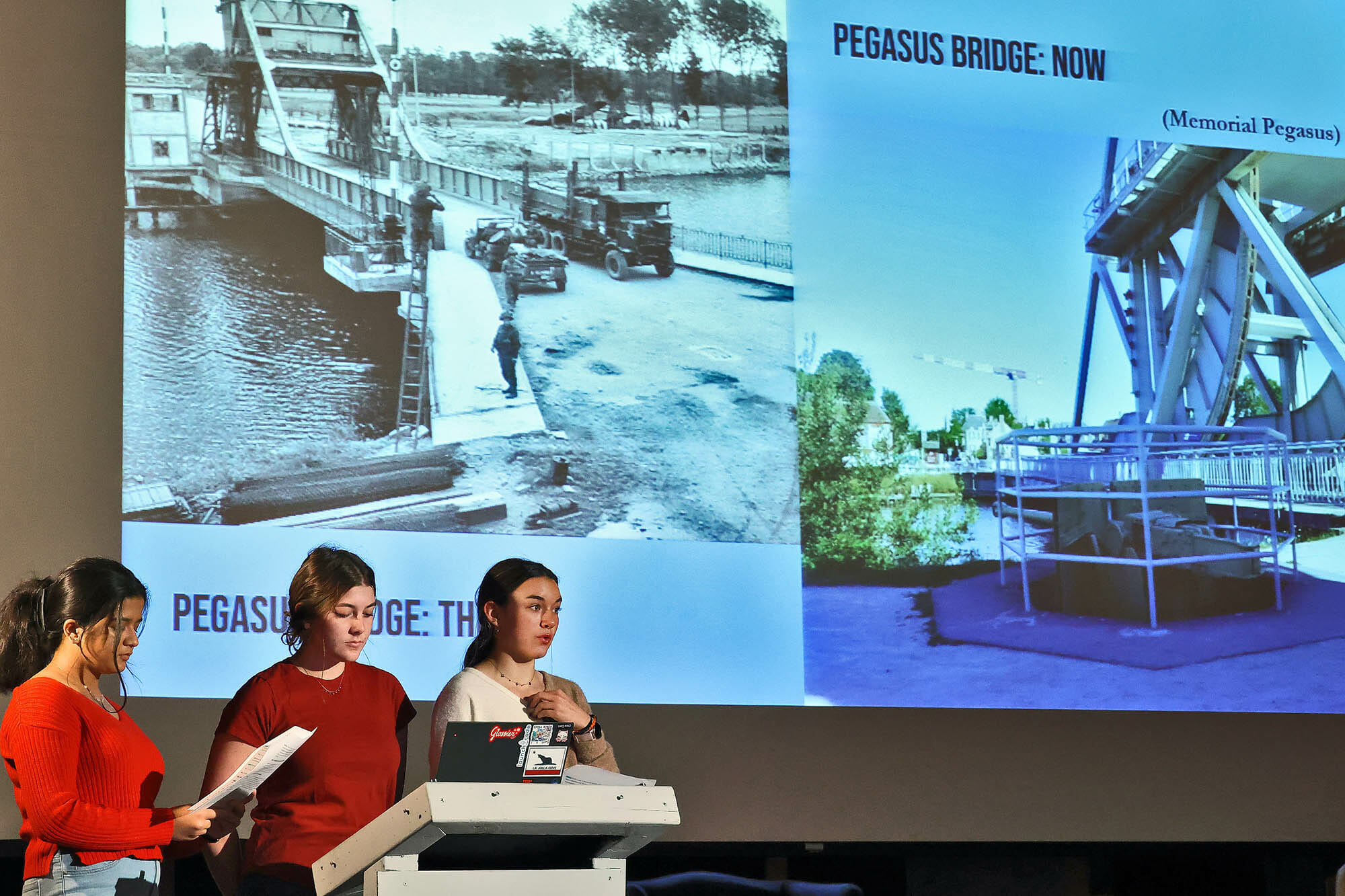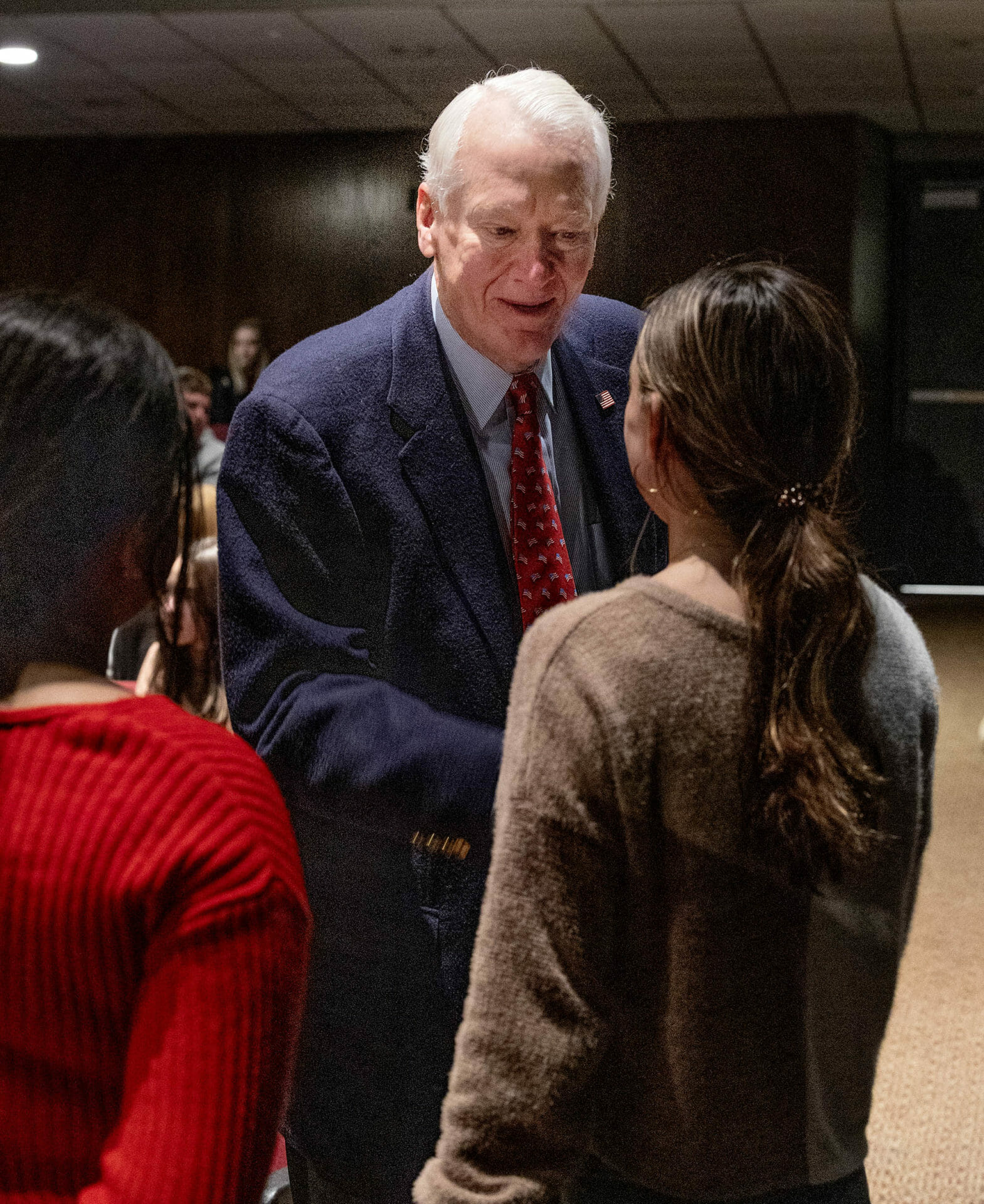Imagine walking along the beaches of Normandy where the historical “D-Day,” also known as “The Turning Point” of World War II, took place. Picture seeing the bridges that were once captured by gliders of the 6th Airborne Division. How would it feel to see the WWII memorials, the American and German cemeteries, or even talk with a then-active member of the French Resistance? All of these were opportunities that three MICDS students, Aanya Tiwari ’23, Chloe Davis ’24, and Abby Wyckoff ’24, experienced this summer as the Pete Wilson ’51 Fellows for Normandy Academy. They walked in the footsteps of those who made history on June 6, 1944, and they shared much of what they learned with the MICDS community last week.
Through the generosity of St. Louis Country Day School alum Edward T. Baur ’64, these students were selected as the Pete Wilson ’51 Fellows for Normandy Academy. As such, they received full scholarships (including flights, tuition, meals, etc.) to participate in the Academy. Upon their return, the fellows shared what they saw and learned with the ninth-grade class which is currently studying World War II. Mr. Baur also attended the presentation.
They described the events of that pivotal day, the strategy behind the invasion, the many sites of significance, and the people involved. A resounding theme was people: “The success of D-Day came from the unparalleled bravery of Allied soldiers…Each person involved treated this operation with such dedication, almost like they were taking on D-Day by themselves. War is always people.”
They detailed the deception involved: how the Allies knew the Germans were falling for their deceitful plans when mathematician Alan Turing cracked the German Enigma machine and how they fooled them with fake, massive airborne landings called “paradummies.” They described how the Germans were ultimately forced to retreat through a single opening known as the “Corridor of Death” where thousands of Germans were captured or killed. This brought about the Allies controlling the Normandy region, then Paris, and allowed them to be well on their way to recapturing control of France.
A highlight for all of the fellows was getting to meet and speak with 90-year-old Madame Colette Marin Catherine who was a 13-year-old member of the French Resistance at the time of D-Day. “She would put anti-German quotes and jokes in the pockets of German coats while they dined at restaurants and would jam their automobile engines by clogging them with sugar,” the presenters said. “It was refreshing to hear lighthearted stories like these for they brought out sheer innocence and a sense of youth amidst the war…Madame Colette became our new hero. She embraced her life and lived it to the fullest given the circumstances. She told all of us that it was never too late to help in making a difference or even be the reason for a difference. Moreover, she empowered all the girls on our trip and of the world by repeatedly enforcing that a woman could do anything and everything just as well as a man.”
They also visited several cemeteries including the American National Cemetery and the German War Cemetery, leaving the Academy students filled with different emotions. They also learned about many of the stories of some of the soldiers and other units.
Below are some reflections from the 2022 Pete Wilson ’51 Fellows for Normandy Academy who grew so much through this experience.
“Growing up, I was surrounded by war as I spent my childhood in Colombo, Sri Lanka, a nation ravaging through a civil war at the time,” said Tiwari. “Not only did this trip allow me to constructively reminisce my memories of war, but I also better understand a monumental point in history that has led us to the present. Following the two weeks, I found myself equipped with endless insights as well as unforgettable memories. Most importantly, I was reminded that war is people. Often, we lose sight of this amidst the violence and chaos. Truly, war is experience and perspective, for war is people. Aside from the learning, I left the trip with a new family and I am beyond grateful for them. To this day, my moments in Bayeux remain engrained in my head, and I would do anything to go back.”
“I loved everything about this trip,” echoed Wyckoff. “From exploring the beaches to meeting some really interesting people, Normandy Academy taught me so many lessons. I really think that what you learn on this trip fully immerses you in the history of the war and the fight for freedom. It also gives you a sense of independence and is an all-around amazing experience.”
For their full presentation, please check out their remarks on the MICDS Blog here.









